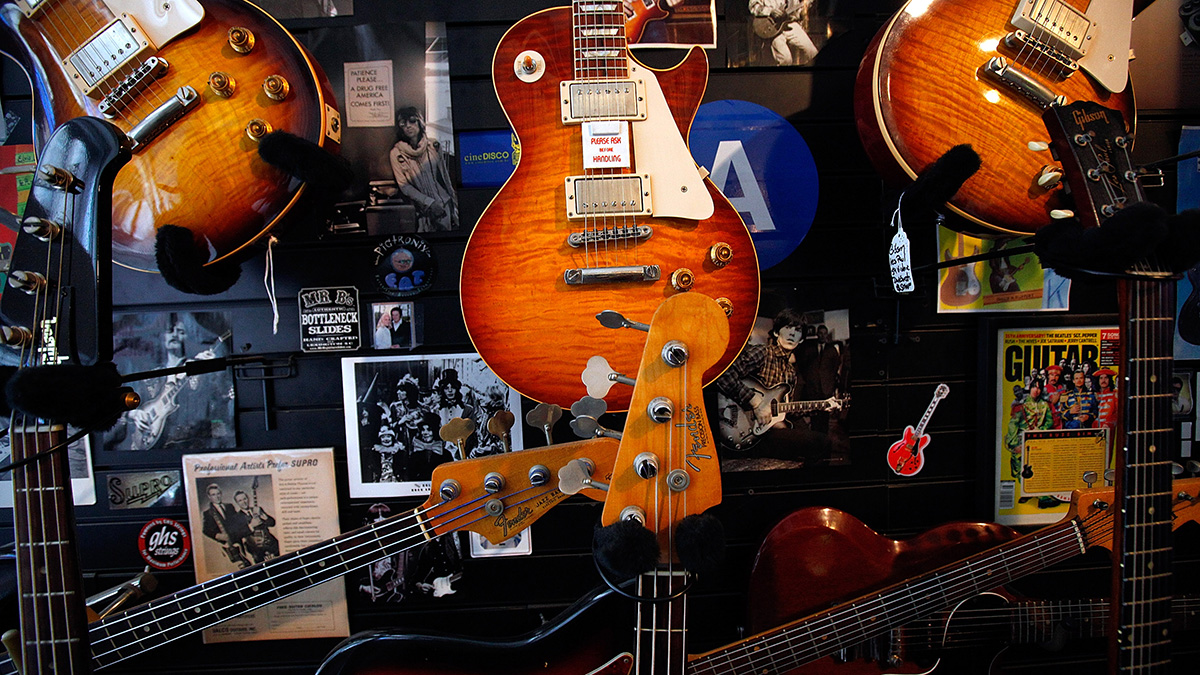10 times an iconic band swapped out their guitarist for a fresh face
These star players swooped in to occupy a vacant guitarist spot – sometimes it made the lineup better, sometimes it saved the band entirely…

GUITAR SHOWCASE 2023: Wouldn’t it be nice if we lived in a world where the original lineups of the bands we love oh-so-dearly stuck it out and stayed together for the kids?
It’s a nice thought, but it’s nothing more than a pipe dream. The grizzled reality is we live in a world where some of the most famous acts still take to the stage and have one, or even none, of their original members among their ranks.
This demands the question: how much are original lineups worth? While we can hope and pray that if our favorite bands lose a member, it’s not anyone “important”, history dictates that even keeping the essential members can be too much to ask. Still, we’ve also seen that replacing even the most seemingly integral cog in the wheel isn’t impossible. And don’t look now, but some of these replacement players have become fan favorites.
So the next time you gripe and complain about your favorite band featuring a new face, take a step back and remember – for better or worse, that band might not be here otherwise. What follows is a guide to 10 memorable replacement guitar players.
1. John 5
John 5’s big break came when he joined David Lee Roth’s band for the recording of 1998’s DLR Band. But his first true turn as a replacement guitarist came when he replaced Zim Zum in Marilyn Manson’s band in 1998.
While John 5’s time in Manson’s band ended in 2004, he’s remained busy through his solo work and his membership in Rob Zombie’s band.
But most recently, the Telecaster-toting shredder has made headlines as Mick Mars’ replacement in Mötley Crüe. With new music on the way and an ongoing tour, fans must accept that John 5’s polarizing presence as a member of Mötley Crüe has only just begun.
Get The Pick Newsletter
All the latest guitar news, interviews, lessons, reviews, deals and more, direct to your inbox!
2. Mick Mars
While Mick Mars was present for Mötley Crüe’s early hours, Greg Leon and Tommy Lee formed the sleaze titans. But the addition of Mars proved pivotal, as his fire-breathing antics defined the band’s early sound.
Furthermore, as the group’s finest and most experienced musician and dedicated showman, Mars was also essential live, too.
One listen shows that Mars’ fingerprints are all over records such as Too Fast for Love (1981), Shout at the Devil (1983), Theater of Pain (1985), Girls, Girls, Girls (1987) and Dr. Feelgood (1989), making Mötley Crüe worldbeaters.
And so, it’s a crying shame that a combination of failing health, infighting and nasty legal proceedings saw to it that Mars’ 2022 departure came with heaping doses of finality.
3. Kane Roberts
Finding himself amid a commercial nadir that came about through massive bouts of substance abuse, by the mid ’80s, Alice Cooper was at an impasse. Dick Wagner had served Cooper well throughout the ’70s, but 1983’s DaDa still plays as one of Cooper’s worst records.
Thankfully, with his burly stature, aggressive nature and melodic-meets-metal style, Kane Roberts came along, making Cooper’s following two offerings, Constrictor (1986) and Raise Your Fist and Yell (1987), his finest in years.
Roberts didn’t stick around much longer, going solo in 1989, but he did return in the fall of 2022 when Nita Strauss took a respite from Cooper’s band.
4. Kelley Deal
It’s hard to imagine the Breeders without the presence of Kim and Kelley Deal. But if we dial back to the group’s inception, Kelley was nowhere to be found – the Breeders’ critically acclaimed debut, Pod (1990), featured Throwing Muses six-stringer Tanya Donnelly.
As for Deal, she came along after Donnelly cleared off to form Belly. And it’s a good thing considering the Breeders somehow managed to best Pod, releasing one of the ’90s’ finest indie rock affairs in 1993’s Last Splash to critical and commercial acclaim.
5. Lindsey Buckingham
Starting with Peter Green and Jeremy Spencer, Fleetwood Mac had run through several guitarists by the time Bob Welch occupied the position. But by 1974, Welch’s time in the seat was also coming to an end, leaving the Mac without a guitarist.
Luckily, Mick Fleetwood ran into Lindsey Buckingham (along with Stevie Nicks) at Sound City Studios, leading to the duo joining the band. The rest, as they say, is history. Albums such as Fleetwood Mac (1975), Rumors (1977), Tusk (1979) and Mirage (1982) are stone-cold classics.
These days, Buckingham is away from Fleetwood Mac once more. Only time will tell if he’ll weave his way back for a third act, but following the death of singer Christine McVie in 2022, it looks unlikely.
6. Nita Strauss
There was a time when Nita Strauss was the sort of player who’d never say “no” to a gig. It’s hard to believe now, given her stature as a superstar, but it’s true. Early in her career, Strauss made a name for herself with the all-women tribute to Iron Maiden, the Iron Maidens.
She even featured as the in-house guitarist for the Los Angeles Kiss (Paul Stanley and Gene Simmons’ arena football team). But Strauss’ signature moment came when she replaced another powerhouse player, Orianthi, in Alice Cooper’s band.
In the years since, Strauss’ legend has grown to the point that these days, as a member of Cooper and Demi Lovato’s band, she’s earned the right to say “no”.
7. Bruce Kulick
By the time Bruce Kulick entered the picture for Kiss, the band had run through two guitarists in two years after the departure of Ace Frehley in 1982. While Vinnie Vincent proved too enigmatic and Mark St. John’s physical issues limited him, Kulick was a breath of fresh air.
His crisp solos and affable personality made him a perfect foil to the huger-than-huge personas of Gene Simmons and Paul Stanley. So it’s sad that Kulick lost his spot to a returning Frehley in ’96.
And while Tommy Thayer now holds the distinction of Kiss’ longest-tenured axeman, Kiss probably wouldn’t exist today without Kulick. Oh, and for those keeping score, Kulick accomplished the feat again when he replaced Mark Farner in Grand Funk Railroad in 2000.
8. Mick Taylor
If Mick Taylor’s only example of replacement guitar heroics came when he replaced Peter Green, who had replaced Eric Clapton in John Mayall’s Bluesbreakers, his legend would be cemented.
But Taylor went on to replace Brian Jones in the Rolling Stones, leading to some of the group’s most celebrated recordings. The only real issue with Taylor’s time as a Rolling Stone is that it didn’t last long enough.
Taylor’s time in the band scratches that soulful lead guitar itch, as he co-authored classic albums like Let It Bleed (1969), Sticky Fingers (1971), Exile on Main St. (1972), Goats Head Soup (1973) and It’s Only Rock ’n Roll (1974).
9. Marty Friedman
Megadeth has featured 12 different lead guitar players over a 40-year career. Staggering, but true.
And it goes without saying that given the demanding nature of Dave Mustaine and the complexity of the music he creates, those 12 players have all been damn talented. Still, Marty Friedman, who came in as a replacement for Jeff Young in 1989, remains a fan favorite.
His tormented solos and riffs heard across the likes of Rust in Peace (1990), Countdown to Extinction (1992) and Youthanasia (1994) are unrelenting in their savage beauty. Friedman’s playing was so inspiring, and so well-loved that to this day, no Megadeth six-stringer carries his level of cache.
10. Kirk Hammett
Kirk Hammett’s entryway into Metallica is a tale as old as time. But for the uninitiated, the abridged version goes like this: Dave Mustaine was Metallica’s original lead guitarist.
And depending on who you ask, Dave wrote much of Metallica’s early material. But Mustaine’s gruff personality and alcohol-induced fits of rage saw to it that he was fired.
From there, Hammett – who had founded Exodus – entered the fold, never to relinquish the spot. Now 11 albums deep, the Bay Area legends have never made an album without Hammett.
So, considering Metallica continues to dominate the globe, along with the fact that Hammett is a hell of a nice guy and a damn good player, it seems that the right call was made.
Andrew Daly is an iced-coffee-addicted, oddball Telecaster-playing, alfredo pasta-loving journalist from Long Island, NY, who, in addition to being a contributing writer for Guitar World, scribes for Bass Player, Guitar Player, Guitarist, and MusicRadar. Andrew has interviewed favorites like Ace Frehley, Johnny Marr, Vito Bratta, Bruce Kulick, Joe Perry, Brad Whitford, Tom Morello, Rich Robinson, and Paul Stanley, while his all-time favorite (rhythm player), Keith Richards, continues to elude him.
“The Beyoncé effect is, in fact, real. I got a lot of traffic just from people checking the liner notes”: With three Grammy wins and plaudits from John Mayer, Justus West is one of modern session guitar’s MVPs – but it hasn’t been an easy ride
“You might laugh a little. The post office shipped your guitar to Jim Root”: This metal fan ordered a new guitar from Sweetwater – but it ended up with the Slipknot guitarist




![John Mayer and Bob Weir [left] of Dead & Company photographed against a grey background. Mayer wears a blue overshirt and has his signature Silver Sky on his shoulder. Weir wears grey and a bolo tie.](https://cdn.mos.cms.futurecdn.net/C6niSAybzVCHoYcpJ8ZZgE.jpg)

![A black-and-white action shot of Sergeant Thunderhoof perform live: [from left] Mark Sayer, Dan Flitcroft, Jim Camp and Josh Gallop](https://cdn.mos.cms.futurecdn.net/am3UhJbsxAE239XRRZ8zC8.jpg)




